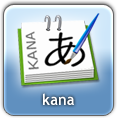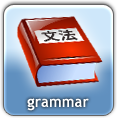 |
5 |
ARU and IRU (ある / いる)
|
Existence, there is/there are, to have, to be, to exist |
 |
5 |
Suffix SAN (さん)
|
Mister, Miss, Mrs. |
 |
5 |
Particle KA (か)
|
Ask a question, interrogative form |
 |
5 |
Particle NO (の)
|
Possession, origin, possessive adjectives |
 |
5 |
Basic construction
|
Japanese sentence, particle WA |
 |
5 |
Particle MO (も)
|
Too, also, as well |
 |
5 |
Interrogative pronoun NANI / NAN (何)
|
What, Which |
 |
5 |
Basic personal pronouns
|
I, you, he, she, we, you, they |
 |
5 |
How to count in Japanese
|
Counters, Hitotsu system |
 |
5 |
-MASU (-ます) -MASEN (-ません) -MASHITA (-ました)
|
Verbs and polite form, politeness |
 |
5 |
Interrogative pronoun DOKO (どこ)
|
Where, which place |
 |
5 |
Japanese adjectives
|
Adjectives, semi-adjectives, keiyoushi |
 |
5 |
Copula DA / DESU (だ / です)
|
Be, auxiliary, politeness |
 |
5 |
MOU and MADA (もう / まだ)
|
Already, still, not yet, no longer, no more |
 |
5 |
SUKI and KIRAI (好き / 嫌い)
|
to like, to love, to dislike, to hate |
 |
5 |
vConj + TAI (-たい)
|
Will, to want to do, I want to do |
 |
5 |
vConj + TAGARU (たがる)
|
Will, to want to do, he wants to |
 |
5 |
Intensity of adjectives
|
Not at all, not much, a little, very, really, a lot |
 |
5 |
vDic + KOTO GA DEKIRU (ことができる)
|
Can, be able to, know how, capacity |
 |
5 |
DAROU and DESHOU (だろう / でしょう)
|
Supposition, probability, politeness |
 |
5 |
TO OMOU (と思う) / DOU OMOU (どうおもう)
|
I think that, to give one's opinion, to ask for someone's opinion |
 |
5 |
vTe + WA + IKENAI (いけない)
|
Forbidding, don't, not allowed to, can't |
 |
5 |
vDic + MAE NI (前に)
|
Anteriority, before doing |
 |
5 |
vDic + TSUMORI (つもり)
|
To mean to, to be going to, intention, volition |
 |
5 |
vConj + HAJIMERU (始める)
|
Start doing, begin to do |
 |
5 |
vConj + SUGIRU (すぎる)
|
Too much, not enough, excess |
 |
5 |
YORI / NO HOU GA / TO ONAJI NI (より / の方が / と同じように)
|
Comparative of superiority / inferiority /equality |
 |
5 |
vTe + KUDASAI (ください)
|
Imperative, polite query |
 |
5 |
Particle omission
|
Particles in an informal context |
 |
5 |
KYOUMI GA ARU (興味がある)
|
To be interested in, to have an interest in, interesting |
 |
5 |
vConj + NI IKU / NI KURU (に行く / に来る)
|
To go to do, to come to do, action and movement |
 |
5 |
vTe + MO II (もいい)
|
To allow, to ask for, don't have to, don't need to |
 |
5 |
JOUZU and HETA (上手 / 下手)
|
To be good at, to be gifted at, to be bad at |
 |
5 |
vTa + KOTO GA ARU (ことがある)
|
Experience, have already done |
 |
5 |
vTe + IRU (いる)
|
Ongoing action, state, repetitive action, in the middle of doing, durative |
 |
5 |
Obligation IKENAI / NARANAI / DAME
|
Obligation, necessity, have to, must |
 |
5 |
vTari + vTari + SURU (たり...たりする)
|
Sequence of actions, enumeration of activities |
 |
5 |
vConj + DASU (出す)
|
To start to, to begin to, sudden action |
 |
5 |
TOKUI and NIGATE (得意 / 苦手)
|
Faculty to do, to be cut out for |
 |
5 |
Adj + KU/NI NARU (なる)
|
To become, evolution, change |
 |
5 |
NO DA and NO DESU (のだ / のです)
|
Explanation, justification, subjectivity |
 |
5 |
HOU GA II (ほうがいい)
|
Preference, advice, suggestion, you should, you'd better |
 |
5 |
Connecting clauses
|
Complex sentences, actions enumeration, -te form, connective base, conjunctive base |
 |
5 |
ICHIBAN (一番) Superlative
|
Superlative, most, the best, the worst |



















